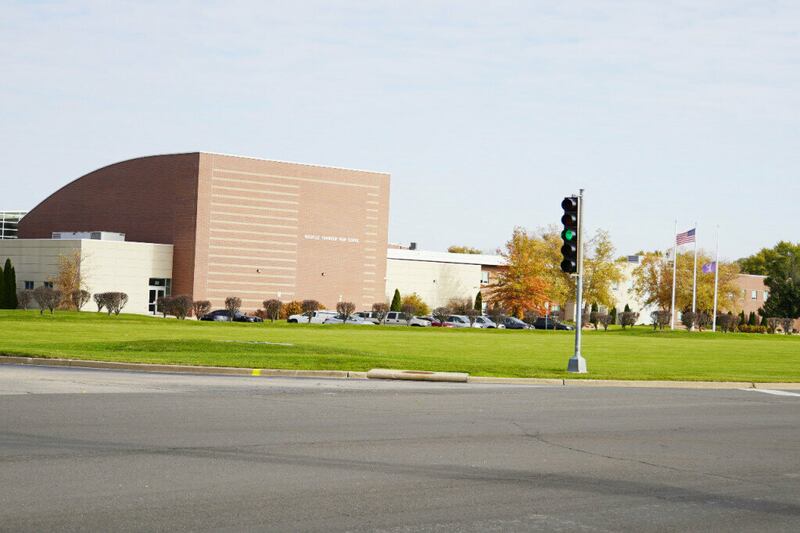Over the past decade, Rochelle Township High School has expanded its dual-credit and advanced placement offerings to better prepare students for what comes next.
After previously offering “a handful” of college-level classes, RTHS now boasts its dual-credit and AP programs as among the region’s strongest. In 2015, RTHS students earned 214 college credit hours through dual credit courses. That number has increased to 1,290 in 2025. More than 75% of the RTHS Class of 2025 graduated with some sort of college credit.
“When three out of every four seniors graduate with some college credit, it changes the story,” RTHS Principal Chris Lewis said. “We’re not just talking about a few students, we’re talking about a cultural shift toward college and career readiness for everyone.”
RTHS students pay $50 per credit hour for dual-credit courses, and that cost is waived for students who qualify for free or reduced lunch. This means a 15-credit semester costs only $250 at RTHS – compared to $2,945 at Kishwaukee College, $6,000 at Northern Illinois University, or $23,000 at an Illinois private college. That’s up to $22,750 in savings per student.
“We know the cost of higher education is a real concern for families,” Lewis said. “Our dual-credit program gives families a head start but it also gives students who might not feel they are up to college to give it a try with minimal financial commitment but tons of RTHS academic support.”
With the way college differs from high school, students in dual-credit courses at RTHS have the advantages of five days a week of instruction and stronger connections with teachers and counselors.
RTHS Counselor and Dual-Credit Coordinator Tasha Bonnell said taking college courses while still in the high school environment sets students up for success.
“Our model gives students the scaffolding they need to succeed in college-level work before they transition to full independence,” Bonnell said. “Meeting five days a week, providing daily accountability, and embedding support makes a huge difference for students who are still building academic habits. Young students are not mature enough to make those academic behavior decisions sometimes.”
AP courses are a key part of RTHS’s dual-credit strategy. AP classes challenge students with college-level content, and those who pass AP exams earn credits accepted at colleges nationwide. In the past year, RTHS students earned 360 college credits through AP exams.
RTHS AP courses are taught by Tim Hill (AP Calculus), John Pfaff (AP Statistics), James Jackson (AP Chemistry), Scott Swartz (AP Advanced Literature), Dave Cartwright (AP U.S. History), Beth Mock (AP Studio Art), Eva Lenkaitis (AP Spanish Language), and Keaton Shumard (AP Music Theory).
RTHS has seen an increase in dual-credit earning among Hispanic students and first-generation college-bound students.
Over the past three years, Hispanic participation in dual credit has nearly doubled. RTHS credits that increase to strategies such as bilingual family communication, advisory support, and a structure that allows students to take college-level classes in a familiar high school environment.
Dual-credit programming at RTHS is not limited to college-bound students. Through the Kishwaukee Education Consortium, RTHS students earn college credit while completing hands-on training in fields like welding, automotive technology, health sciences, early childhood education, and culinary arts. Students can earn industry-recognized certifications through the program and start jobs immediately after high school.
“KEC dual-credit classes are a direct pathway to a skilled trade and a sustainable career,” Lewis said. “Both options matter, and both reflect our commitment to preparing students for tomorrow.”
RTHS teachers have spent time earning certification to teach college-level courses. To become certified, teachers must hold a master’s degree in the subject area they plan to teach or a master’s degree in another field plus 18 graduate-level credit hours in the subject area.
Starting in 2026-2027, RTHS will offer four new dual-credit courses: U.S. History I and II, Biology, and Chemistry.
Teachers who are currently pursuing dual-credit credentials are David Cartwright, Jarrod Reynolds, Justing Otte, Anna Criswell, Kevin Hunt, and Jonathan Gehm.
Current RTHS dual-credit certified teachers are Matt Hagemann (ENG 103, ENG 104), Scott Swartz (ENG 103, ENG 104), Eva Lenkaitis (SPAN 202, SPAN 203), Rachel Plock (MAT 101, MAT 208, MAT 150), Holly Karner (PSY 102, SOC 170), Anna Adolph (COMM 101), Kurt Wolter (CAD 110), Donna Page (Agriculture AGT Series), Deanna Jacobs (Agriculture AGT Series), and Kristin Flanagan (Intro to Education).
“Our amazing teachers are key to this program,” Lewis said. “Without their desire to go after these endorsements, our students would not have these opportunities at RTHS.”
